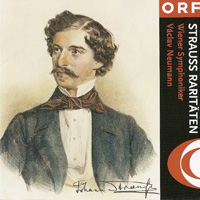 |
| April 1, 2007 Treasurable Johann Strauss from Václav Neumann
Not so awfully long ago, Strauss waltzes and polkas were part of the standard concert repertory everywhere. The legendary conductors of the past would follow a Schubert or Bruckner or Beethoven symphony with a bunch of Johann Strauss’s masterworks. Today these gems are rarely encountered in our concert halls, except in under-rehearsed pop concerts (which themselves tend to shun them now in favor of more "contemporary" fare). When they do make their rare appearances in subscription concerts, they all too often leave us more grateful for the gesture itself than for what we hear. Even the famous Vienna Philharmonic New Year concerts bring varying levels of disappointment to the true believers raised on the performances conducted by Clemens Krauss, the founder of those concerts, and such contemporaries of his as Josef Krips, Franz Salmhofer, Karl Böhm and Erich Kleiber. Kleiber’s son Carlos, who died three years ago, was perhaps the only conductor to match them fully in recent years. Václav Neumann, the longtime conductor of the Czech Philharmonic, who died in 1995, is a totally unexpected addition to this exalted list, and according to the annotation with this recording the assignment came as a surprise to him, but the supporting evidence is clear in this recording, made in September 1989. This needn’t be entirely surprising, perhaps, to those familiar with Neumann’s earlier recordings with his own Czech Philharmonic of waltzes and marches by his compatriot Julius Fucík -- or simply to anyone familiar with this conductor’s broader discography. It is no stretch at all to state that every recording Neumann made, whether in Prague or in Leipzig, whether of Mahler, Dvorák, Beethoven or Martinu, shines with his utter conviction, his deep understanding, and the overall sense of fulfillment in the level of playing he drew from his troops.
The sound quality is very good indeed, beautifully balanced, rich enough to convey the full flavor of the music. (One notices some very distinguished musical family names among the production credits: Robert Werba is listed as what we would call executive producer, and the session producer was Hans Moralt.) The annotation was provided by Franz Mailer, who wrote the German notes for the Marco Polo series of music of the various Strausses, and is again exceptionally comprehensive. In this case, however, instead of separate notes in English, ORF has provided a translation that contains an example or two of "unintended humor." Amid so much great listening, that sort of thing may indeed be dismissed with good humor. In every meaningful sense this CD is an out-and-out joy; the sense of discovery plays a large part in it, but this level of music-making, irrespective of the genre or how well known the music may be, can never be taken for granted. The catalogue number is ORF 35; retailers who don’t know about it may be directed to Albany Music Distributors. ...Richard Freed
Ultra Audio is part of the SoundStage! Network. |
 This feature, "Keepers," was
created to call attention to uniquely valuable recordings that have been around for a
while and are being unjustly overlooked, or in some instances may not be in the current
catalog and are worth hunting for. The one under discussion now, however, was issued in
North America just now, but calls for this kind of attention by virtue of its delayed
release here (it was apparently issued in Europe ten years ago) and the label on which it
appears, which may or may not have the staying power of some of the more familiar ones. It
is something totally unexpected, and is simply the loveliest sort of surprise: music of
Johann Strauss II, the Waltz King, performed by the Vienna Symphony Orchestra under the
revered Czech conductor Václav Neumann, on the label of the ORF, the Austrian Radio.
This feature, "Keepers," was
created to call attention to uniquely valuable recordings that have been around for a
while and are being unjustly overlooked, or in some instances may not be in the current
catalog and are worth hunting for. The one under discussion now, however, was issued in
North America just now, but calls for this kind of attention by virtue of its delayed
release here (it was apparently issued in Europe ten years ago) and the label on which it
appears, which may or may not have the staying power of some of the more familiar ones. It
is something totally unexpected, and is simply the loveliest sort of surprise: music of
Johann Strauss II, the Waltz King, performed by the Vienna Symphony Orchestra under the
revered Czech conductor Václav Neumann, on the label of the ORF, the Austrian Radio.  The Vienna Symphony Orchestra (Wiener
Symphoniker) is of course not the celebrated Philharmoniker, but it is a fine
ensemble in its own right, and no less steeped in the idiom of this music, having worked
with such conductors as Salmhofer, Herbert von Karajan and Eduard Strauss II. The disc is
headed Johann Strauss-Raritäten (Johann Strauss Rarities), and not one of the 12
items is familiar to many of us. Some of the pieces are early works, but not all of them.
There are three grand waltzes -- Spiralen, Johannis-Käferlein and Die
Jovialen -- two quadrilles on Verdi tunes, and a glittering selection of polkas and
marches. Only the concluding Furioso-Polka might seem at all familiar, but more
likely it’s only the title itself that makes it so, for the Waltz King’s father,
Johann Strauss I, affixed the same title to one of the relatively few pieces of his we are
likely to hear nowadays. The bottom line here is that everything on this CD is a
cherishable discovery, and that "everything" definitely includes both the vigor
and the affection in Neumann’s knowing way with the music.
The Vienna Symphony Orchestra (Wiener
Symphoniker) is of course not the celebrated Philharmoniker, but it is a fine
ensemble in its own right, and no less steeped in the idiom of this music, having worked
with such conductors as Salmhofer, Herbert von Karajan and Eduard Strauss II. The disc is
headed Johann Strauss-Raritäten (Johann Strauss Rarities), and not one of the 12
items is familiar to many of us. Some of the pieces are early works, but not all of them.
There are three grand waltzes -- Spiralen, Johannis-Käferlein and Die
Jovialen -- two quadrilles on Verdi tunes, and a glittering selection of polkas and
marches. Only the concluding Furioso-Polka might seem at all familiar, but more
likely it’s only the title itself that makes it so, for the Waltz King’s father,
Johann Strauss I, affixed the same title to one of the relatively few pieces of his we are
likely to hear nowadays. The bottom line here is that everything on this CD is a
cherishable discovery, and that "everything" definitely includes both the vigor
and the affection in Neumann’s knowing way with the music.